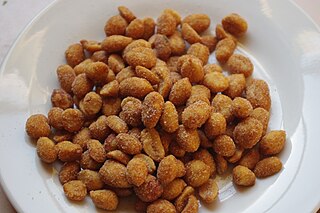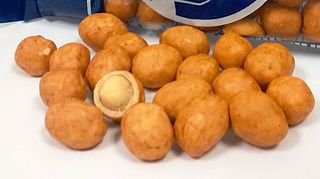
Duyvis is a Dutch brand of salty snacks, peanuts and nuts. Dip sauces are also sold under the Duyvis brand.

Duyvis is a Dutch brand of salty snacks, peanuts and nuts. Dip sauces are also sold under the Duyvis brand.
The Duyvis name is attested since the 16th century in the Zaanstreek. [1] In 1806, Teewis Duyvis (1757–1832), member of an anabaptist family of Oostzaandam inherited from his uncle the oil windmill De Ooijevaar near the Zaanse Schans, where it was built in 1670 and is still operational. Oil mills were used in the production of cattle-fodder with linseed oil as a by-product. The grandson of Teewis, who was also called Teewis (1825–1875), took over the company in 1850. The company expanded with several oil mills and was called Teewis Duyvis Jansz, after the grandson of the first Teewis. At one point Duyvis owns seven windmills, primarily in Koog aan de Zaan.
In 1880 Ericus Gerardus Duyvis, son of the second Teewis, built a steam oil factory and still produced mainly cattle-fodder. As of 1908 the company started exporting linseed oil and in 1920 it started to refine the oil. Between 1920 and 1930 the company became one of the largest oil exporting companies of the Netherlands. During the crisis years turnover declined and the company started producing salad oil for consumer usage. Throughout World War II oil production declined due to the inability to import the necessary raw materials. The company switched to the production of other vegetable oils products and increased its focus on the consumer market by selling branded products such as Mayolande which was sold under the Bénénuts brand.
In 1958 the company received the status of a ‘Royal’ company which it retained until 1961 when it was taken over by Akzo. In 1987 Duyvis was taken over by Douwe Egberts. In 1991, a new factory was built, still on the same location where Teewis Duyvis started in 1806 and Duyvis became the largest peanut and nut brand in the Netherlands. In 2006 Douwe Egberts (a subsidiary of Sara Lee) sold Duyvis to PepsiCo, a soft drink and snack manufacturer. [2]
In 2006 Duyvis celebrated its 200th anniversary.
Duyvis peanuts exist in many varieties. Besides plain peanuts there are peanuts that are roasted, marinated, sprinkled with herbs or in combination with other seeds and salty snacks. Some of the peanuts are covered with crunchy coatings of dough in different flavours, known as borrelnootjes (cocktail nuts).

The peanut, also known as the groundnut, goober (US), pindar (US) or monkey nut (UK), is a legume crop grown mainly for its edible seeds. It is widely grown in the tropics and subtropics, important to both small and large commercial producers. It is classified as both a grain legume and, due to its high oil content, an oil crop. World annual production of shelled peanuts was 44 million tonnes in 2016, led by China with 38% of the world total. Atypically among legume crop plants, peanut pods develop underground (geocarpy) rather than above ground. With this characteristic in mind, the botanist Carl Linnaeus gave peanuts the specific epithet hypogaea, which means "under the earth".

Nabisco is an American manufacturer of cookies and snacks headquartered in East Hanover, New Jersey. The company is a subsidiary of Illinois-based Mondelēz International.

Peanut butter is a food paste or spread made from ground, dry-roasted peanuts. It commonly contains additional ingredients that modify the taste or texture, such as salt, sweeteners, or emulsifiers. Consumed in many countries, it is the most commonly used of the nut butters, a group that also includes cashew butter and almond butter.

Joure is a town in the north of the Netherlands. It is the administrative center of De Fryske Marren, Friesland. With 13,090 inhabitants, it is also the most populous town in the municipality.

Planters Nut & Chocolate Company is an American snack food company now owned by Hormel Foods. Planters is best known for its processed nuts and for the Mr. Peanut icon that symbolizes them. Mr. Peanut was created by grade schooler Antonio Gentile for a 1916 contest to design the company's brand icon. The design was modified by a commercial artist and has continued to change over the years.

Corn nuts, also known as toasted corn, are a snack food made of roasted or deep-fried corn kernels. It is referred to as cancha in Peru and chulpi in Ecuador.
Nobby's is Australia's largest nuts brand, manufactured by The Smith's Snackfood Company, the Australian snacks division of PepsiCo.

Beer Nuts is an American brand of snack food building on the original product, peanuts with a sweet-and-salty glazing. According to the manufacturer, the ingredients include peanuts, coconut oil, corn syrup and salt. In the United States, Beer Nuts are a staple of bar snacks and are often referred to as "the quintessential American bar food".

Diamond Foods was an American packaged food company based in San Francisco, that marketed nuts and other snack foods. Diamond Foods was acquired by Snyder's-Lance in 2016, and as of 2018, Campbell Soup Company owns Diamond Foods's former snack brands; Diamond of California, Diamond Foods's nut business, is owned by Blue Road Capital.

Drum is a Dutch brand of fine-cut handrolling tobacco, or shag, introduced in 1952. It was originally produced and distributed by the Douwe Egberts corporation. Douwe Egberts was purchased by the Sara Lee Corporation, which sold Drum to Imperial Brands, the current British producer.
KP Snacks Ltd is a British producer of branded and own-label maize-, potato-, and nut-based snacks, "Choc Dips" and nuts. The KP stands for “Kenyon Produce”. The company is based in Slough, England, UK.

Mixed nuts are a snack food consisting of any mixture of mechanically or manually combined nuts. Common constituents are peanuts, almonds, walnuts, Brazil nuts, cashews, hazelnuts (filberts), and pecans. Mixed nuts may be salted, roasted, cooked, or blanched.

Benin is predominantly a rural society, and agriculture in Benin supports more than 70% of the population. Agriculture contributes around 35% of the country's gross domestic product (GDP) and 80% of export income. While the Government of Benin (GOB) aims to diversify its agricultural production, Benin remains underdeveloped, and its economy is underpinned by subsistence agriculture. Approximately 93% of total agricultural production goes into food production. The proportion of the population living in poverty is about 35.2%, with more rural households in poverty (38.4%) than urban households (29.8%). 36% of households depend solely upon agricultural (crop) production for income, and another 30% depend on crop production, livestock, or fishing for income.

Utz Brands, Inc., more commonly known as Utz, is an American snack food company based in Hanover, Pennsylvania. The company produces a variety of potato chips, pretzels, and other snacks, with most products sold under their family of brands. Utz is also a snack supplier to warehouse clubs and merchandisers.

Honey-roasted peanuts is a salt-, sugar- and honey-flavored peanut snack food that is provided as a mass-produced product line by several nut and snack food companies, such as Planters, The Sun Valley Nut Co, and King Nut.
Big D is a British brand of peanuts and other snack foods primarily sold in pubs. It was introduced in 1967. The brand includes 50g packets of nuts, both carded and tumble. They are distributed within the licensed and retail trade in the UK, and also in Ireland under an agreement with the Irish snack food manufacturer Tayto. The brand's peanut varieties include salted, dry roasted, bird's eye chili and honey roasted. The brand also includes salted cashews and smoked almonds. A range of shelf keeping units are also provided for various occasions and channels of trade.

JDE Peet's is an American-Dutch company that owns beverage brands, mostly of coffee, tea and hot chocolate. It was formed in 2015 following the merger of the coffee division of Mondelez International with Douwe Egberts as Jacobs Douwe Egberts. The stock of JDE Peet's is listed on the Euronext Amsterdam stock exchange.

Aarhus Oliefabrik A/S was a company and oil mill in Aarhus, Denmark. Established in 1871 it was one of the largest employers and exporters in the city through the late 19th and early 20th centuries.

Japanese-style peanuts, also known as Japanese peanuts or cracker nuts, are a type of snack food made from peanuts that are coated in a wheat flour dough and then fried or deep-fried. They come in a variety of different flavours. The Mexican version’s recipe for the extra-crunchy shell has ingredients such as wheat flour, soy sauce, water, sugar, monosodium glutamate, and citric acid. The snacks are sold in sealed bags.